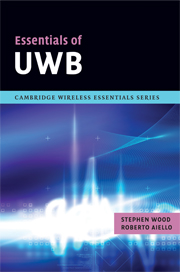Book contents
- Frontmatter
- Contents
- 1 Introducing ultra-wideband (UWB)
- 2 Matching UWB to HDR applications
- 3 Physical-layer (PHY) characteristics
- 4 Media-access control (MAC) layer
- 5 Implementation information
- 6 Upper-layer protocols
- 7 Ultra-wideband standardization
- 8 Special-interest groups
- 9 Ultra-wideband business issues
- 10 Regulating ultra-wideband
- 11 Tragedy of the commons
- Appendix: Reference documents
- Author biographies
- Index
- References
1 - Introducing ultra-wideband (UWB)
Published online by Cambridge University Press: 22 August 2009
- Frontmatter
- Contents
- 1 Introducing ultra-wideband (UWB)
- 2 Matching UWB to HDR applications
- 3 Physical-layer (PHY) characteristics
- 4 Media-access control (MAC) layer
- 5 Implementation information
- 6 Upper-layer protocols
- 7 Ultra-wideband standardization
- 8 Special-interest groups
- 9 Ultra-wideband business issues
- 10 Regulating ultra-wideband
- 11 Tragedy of the commons
- Appendix: Reference documents
- Author biographies
- Index
- References
Summary
If you are interested in a deep theoretical treatise on ultra-wideband, there are several excellent texts, which are listed at the end of this chapter, that we recommend [1, 2]. Essentials of UWB will definitely not fill that need. It is far too concise and practical and it fails to take up the requisite three inches of shelf space that are required to fill that niche in the literature.
If you are an engineer, business professional, regulator or marketing person who needs enough technical information to build, sell or regulate products that include a UWB radio, but don't aspire to become a radio frequency (RF) deity in your own right, this is the text that you are looking for. Our objective in writing this book is to provide a dependable overview of the data that you need to know to understand the technology and the industry. This includes technical overviews, industry organization, intellectual property overview, standardization and regulatory discussions. We will also attempt to provide pointers to source documents for deeper investigation for those who are so inclined. We know where the good data are buried because in many cases we had a hand in putting it there. Dr Aiello founded two UWB start-ups, contributed actively to the US regulatory processes, participated in the IEEE standardization wars and performed much of the early development of UWB modulation schemes and radio designs. He has also been a board member in the WiMedia Alliance for a number of years.
- Type
- Chapter
- Information
- Essentials of UWB , pp. 1 - 18Publisher: Cambridge University PressPrint publication year: 2008



